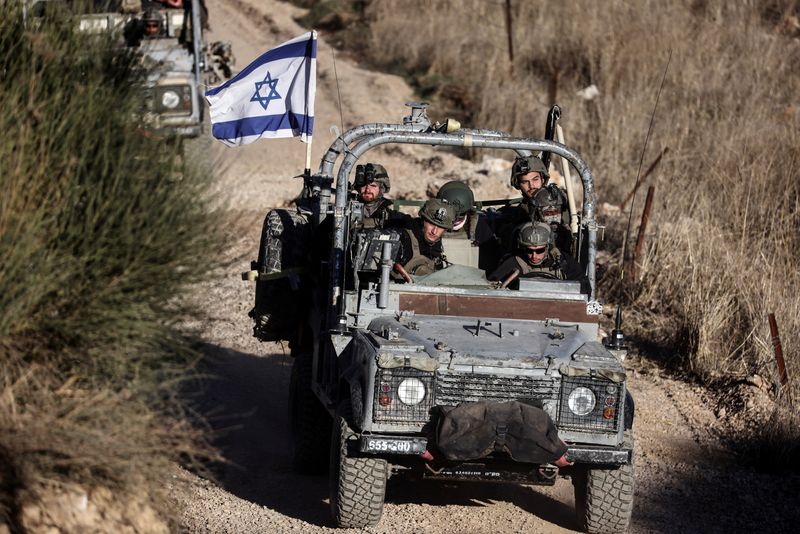Useful information
Prime News delivers timely, accurate news and insights on global events, politics, business, and technology
Useful information
Prime News delivers timely, accurate news and insights on global events, politics, business, and technology

By Howard Goller
JERUSALEM (Reuters) – Israel agreed on Sunday to double its population in the occupied Golan Heights, while saying threats from Syria persisted despite the moderate tone of rebel leaders who overthrew President Bashar al-Assad a week ago.
“Strengthening the Golan is strengthening the State of Israel, and it is especially important at this time. We will continue to maintain it, make it flourish and establish ourselves there,” Prime Minister Benjamin Netanyahu said in a statement.
Israel captured most of Syria’s strategic plateau in the 1967 Six-Day War and annexed it in 1981.
In 2019, then-President Donald Trump declared US support for Israeli sovereignty over the Golan, but the annexation has not been recognized by most countries. Syria demands that Israel withdraw, but Israel refuses, citing security concerns. Several peace efforts have failed.
Netanyahu said he spoke with Trump on Saturday about security developments in Syria.
“We have no interest in a conflict with Syria,” Netanyahu said in a statement. Israeli actions in Syria were aimed at “thwarting potential threats from Syria and preventing the takeover of terrorist elements near our border,” he added.
Defense Minister Israel Katz said in a statement that the latest developments in Syria increased the threat to Israel, “despite the moderate image that rebel leaders claim to present.”
Netanyahu’s office said the government unanimously approved a more than 40 million shekel ($11 million) plan to encourage population growth in the Golan.
He said Netanyahu presented the plan to the government “in light of the war and the new front facing Syria, and out of the desire to double the population of the Golan.”
Saudi Arabia, Qatar and the United Arab Emirates condemned Israel’s decision, with the United Arab Emirates, which normalized relations with Israel in 2020, describing it as a “deliberate effort to expand the occupation.”
Some 31,000 Israelis have settled there, said analyst Avraham Levine of the Alma Research and Education Center, who specializes in Israel’s security challenges on its northern border. Many work in agriculture, including vineyards, and in tourism. The Golan is home to 24,000 Druze, an Arab minority that practices a branch of Islam, Levine said. Most identify as Syrian.
AVOID ‘NEW Clashes’
Syria’s de facto leader Ahmad al-Sharaa said on Saturday that Israel was using false pretexts to justify its attacks on Syria but was not interested in getting involved in new conflicts while his country focuses on reconstruction.
Sharaa, better known as Abu Mohammed al-Golani, leads the Islamist group Hayat Tahrir al-Sham (HTS) that ousted Assad from power last Sunday, ending five decades of the family’s heavy-handed rule.
Israel has since moved into a demilitarized zone inside Syria that was created after the 1973 Arab-Israeli war, including the Syrian side of the strategic Mount Hermon overlooking Damascus, where its forces seized an abandoned Syrian military outpost.
Israel, which has said it has no intention of remaining there and calls the incursion into Syrian territory a limited and temporary measure to ensure border security, has also carried out hundreds of attacks against Syria’s strategic weapons stockpiles.
It has said it is destroying weapons and military infrastructure to prevent them from being used by the rebel groups that ousted Assad from power, some of which emerged from movements linked to al Qaeda and the Islamic State.
Several Arab countries, including Saudi Arabia, the United Arab Emirates and Jordan, have condemned what they called Israel’s seizure of a buffer zone in the Golan Heights.

“Syria’s war-weary condition, after years of conflict and war, does not allow for new confrontations. The priority at this stage is reconstruction and stability, not being drawn into disputes that could lead to further destruction,” Sharaa said in an interview published on the website of Syria TV, a channel that sides with the rebels.
He also said diplomatic solutions were the only way to ensure security and stability and that “uncalculated military adventures” were not wanted.